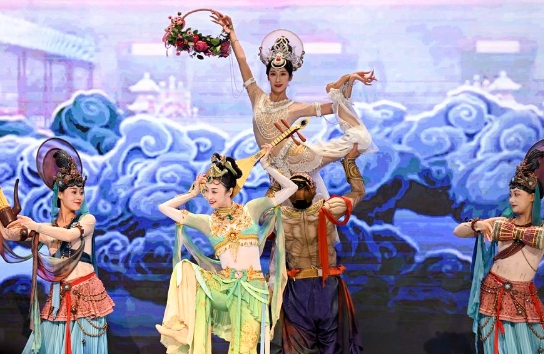German sinologist amazed by splendid Dunhuang culture

Actors give a performance on the theme of Dunhuang culture at the opening ceremony of the fourth Dialogue on Exchanges and Mutual Learning among Civilizations in Dunhuang, northwest China's Gansu Province, May 30, 2025. (Xinhua/Zhang Ling)
Known for his deep engagement with Chinese literature, German sinologist Martin Woesler recently made his first visit to the ancient Silk Road hub of Dunhuang in northwest China's Gansu Province, where he was captivated by the city's unique cultural charm.
Starting from Hunan Normal University in central China, where he currently teaches, Woesler traveled northwest to attend the fourth Dialogue on Exchanges and Mutual Learning among Civilizations, held in Dunhuang from May 29 to 31. During his brief stay in Gansu, he joined scholars from Japan, the Republic of Korea, the United States, Thailand and other countries in sharing insights regarding the theme of cross-cultural dialogue.
Before going to Dunhuang, Woesler had done his homework. From books, he gathered vivid impressions of Dunhuang -- an oasis city encircled by desert, a treasure trove of art and heritage, and a cultural crossroads shaped by centuries of Silk Road exchanges.
However, when the words and images contained in the books were confirmed by his own eyes, Woesler found himself deeply moved. A lifelong enthusiast of Chinese culture and literature, he has lived, worked and studied in China for over 30 years, and yet despite his lengthy stay in the country, Dunhuang ended up providing him with a cultural experience unlike any other.
During his short trip, Woesler visited several of the city's most iconic sites he had long looked forward to seeing for himself. Standing in front of the Mogao Grottoes for the first time, he was profoundly impressed by an unexpected sense of cultural connection -- one that bridged both time and geography.
In Cave 285, often referred to as a "pantheon of diverse cultures," the frescoes feature an extraordinary blend of figures -- Apollo and Diana from Greek mythology, Fuxi and Nuwa from Chinese legends, flying apsaras from Indian Buddhism and feathered immortals from Daoism.
It is the fusion of civilizations that gave rise to the magnificent, millennia-old cultural miracle embodied in Dunhuang, where diverse traditions coexist harmoniously within the confines of a single cave, noted Woesler.
"Dunhuang is truly an amazing place. Few places have such deep cultural influence in the world," said Woesler, who believes that even today, across thousands of years, people from different countries can still draw wisdom and strength from Dunhuang's spirit of inclusiveness and mutual learning.
Woesler's connection with China began 38 years ago at a poetry reading in his hometown of Munster, in Germany, where he was captivated by a Chinese poem. That moment sparked his interest in Chinese culture and eventually led him to study at Peking University in Beijing, thus embarking on a lifelong journey into Chinese literature.
For decades, Woesler has worked to bridge the gap between cultures. His career has frequently taken him between Germany and China, and he remains committed to helping the world better understand Chinese literature and culture.
Woesler sees translation as a key tool for fostering cultural exchange. While many foreign works are available in Chinese, far fewer Chinese literary works have been translated into German. To address this shortage, Woesler launched a translation workshop to engage young German sinologists and promote Chinese literature abroad.
His journey to Dunhuang has now sparked new reflections on cultural dialogue in the digital age. Woesler believes that modern technologies like digital preservation and virtual exhibitions can make ancient heritage more accessible, offering fresh ways to deepen mutual understanding between civilizations.
"People today must embrace differences with greater openness to advance civilizational exchange and dialogue amid digital-era challenges. Only by working together can we realize mutual benefit and win-win progress," said Woesler.
Editor:伏娅敏
